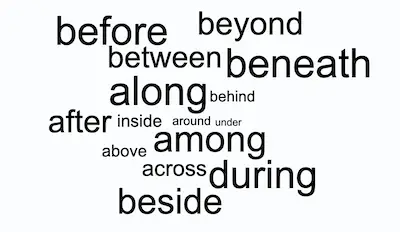In some people’s minds there exists a grammatical rule which instructs us not to end a sentence with a preposition. Fear not, there isn’t. That rule, such as it ever was, seems to have been an invention of a few 17th century English writers who wanted to align English more with Latin, where endings like ‘with’, ‘about’, ‘of’ are considered ungrammatical.
The person most closely associated with this invented rule is the poet John Dryden who criticised the playwright Ben Jonson for using lines like “This figure that thou here seest put”. According to Dryden, “The preposition in the end of the sentence; a common fault with him.”.
Like many other invented grammatical rules there’s no clear reason why anyone should be constrained by this one.
It is widely reported that Sir Winston Churchill coined the line “this is the sort of English up with which I will not put”, in order to make fun of the supposed rule. It’s quite likely that he wasn’t the person who coined this expression.
The English civil servant and writer Sir Ernest Gowers is usually considered to be the person who made that attribution, but even that is in doubt. The first known example of the expression in print is from The Strand Magazine, London, 1942, reprinted in The Wall Street Journal, 30 September 1942:
When a memorandum passed round a certain Government department, one young pedant scribbled a postscript drawing attention to the fact that the sentence ended with a preposition, which caused the original writer to circulate another memorandum complaining that the anonymous postscript was “offensive impertinence, up with which I will not put.”
The implication is that the phrase which was considered to be in need of correction was “This is something which I will not put up with”.
In Gowers’ Plain Words,1948, he wrote:
It is said that Mr. Winston Churchill once made this marginal comment against a sentence that clumsily avoided a prepositional ending: “This is the sort of English up with which I will not put”.
Several sources linked Churchill with the expression in 1948 and Gowers may have taken his lead from one of them.
The phrase certainly sounds Churchillian and he did write for The Strand Magazine but there’s no evidence to establish Churchill as the author.
Other such spurious rules are:
Avoidance of split infinitives.
This one was dying out by the 1960s, not least because so few people knew what a split infinitive was. The nail was put firmly in the coffin in 1966 when Star Trek credits announced the crew would “Boldly go where no man has gone before”.
I before e except after c.
This spelling rule was drilled into us grammar school students in the 1960s. It wasn’t until much later that I realised that the sequence of ei after c appears in numerous properly spelled words, for example, ‘receive’, ‘ceiling’, ‘conceit’.
‘Less’ cannot be used to apply to items which can be counted; ‘fewer’ should be used instead.
What purists get hot under the collar about is supermarket signs showing “5 items of less” etc. What they say is that it should be “5 items or fewer”. Why?
See ‘less versus fewer‘ for more details on that.

